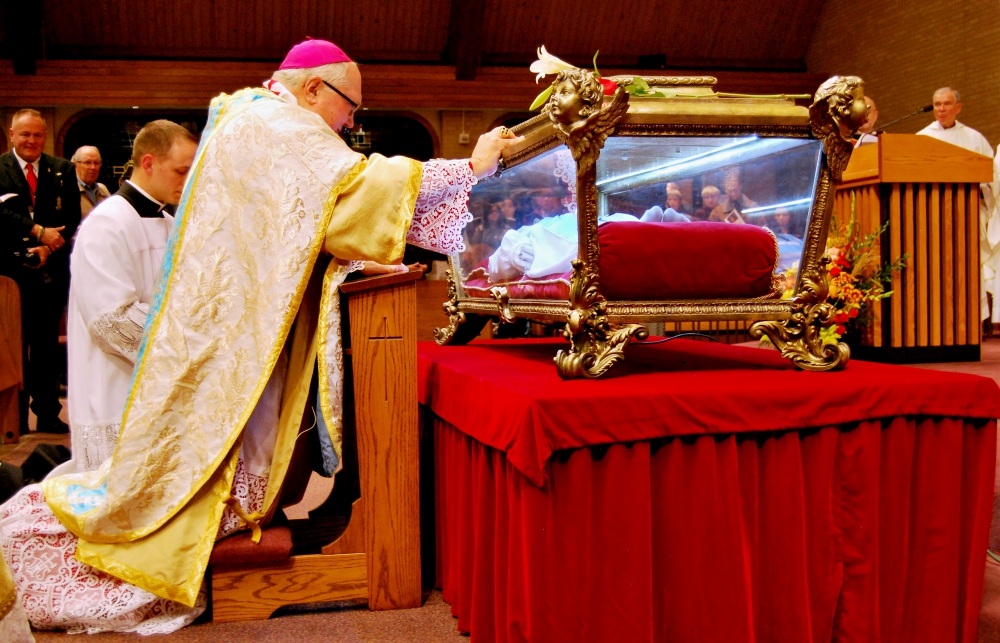
Bishop Robert Morlino of Madison, Wisconsin, venerates relics of St. Maria Goretti at St. Maria Goretti Church in Madison in 2015. (CNS/Catholic Herald/Kevin Wondrash)
Another is education for women and children. Sisters working as teachers and catechists educate children about trafficking and empower women to pursue small businesses, farming and livestock rearing. These efforts help women increase their daily earnings.
We also provide support for vulnerable children. Our orphanage centers, St. Martin de Porres in Sumbawanga and St. John Paul II in Mpanda, care for children who are orphaned, abandoned or otherwise vulnerable, such as children with albinism. We provide them with parental care, education and a protective environment to reduce their risk of exploitation.
Many in Sumbawanga remain unaware of the issue of human trafficking, often not knowing they are being trafficked or are trafficking other people. Poverty among women increases the risk of trafficking for themselves and their children. In order to eradicate the issue of human trafficking we have to empower women through education and economic opportunities, enabling them to recognize and escape exploitation.
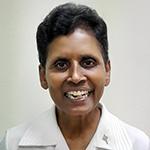
Jean Fernandez, a member of the Sisters of Our Lady of Charity of the Good Shepherd, served as a missionary in the United States for more than 30 years with the Province of Mid-North America. In 2021, she returned to Singapore, where she now ministers within the Singapore-Malaysia province. With a degree in counseling psychology, she focuses on spiritual mentorship and counseling, accompanying individuals on their faith journeys and offering services in mental health. She also serves as a supervisor and educator at Marymount Convent School in Singapore, dedicated to guiding both youth and adults.
Human trafficking is a grave wound to human dignity that demands a response rooted in compassion and love. For me, this mission became profoundly personal.
One quiet night during the pandemic, as part of a small group, we walked desolate streets, searching for women trapped in the shadows of exploitation. Each step felt heavy with the weight of untold stories, but amid the darkness, we encountered glimpses of resilience.
One encounter remains etched in my soul—a deaf woman whose pain spoke volumes even in silence. Using sign language and a notepad, we bridged the gap with fragile threads of written words. In her presence, I felt a stirring call: to embody Christ the Good Shepherd, reflecting God's merciful love. Her story was sacred, reminding me of our Good Shepherd charism "One person is of more value than the whole world."
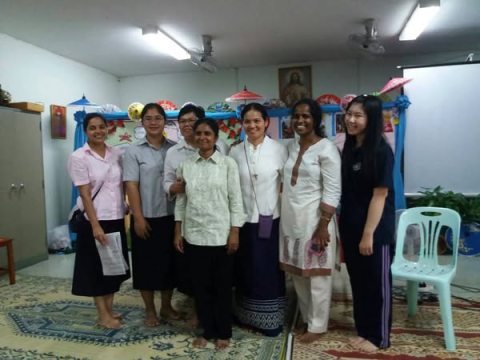
Sisters and partners-in-mission gather in Sabah, Malaysia. (Courtesy of the Good Shepherd Sisters)
The Good Shepherd mission extends far beyond the streets, across the Asia-Pacific region. In Malaysia, Global Shepherds — a ministry within the larger Good Shepherd network — has managed shelters for the past 50 years. Here, our sisters and partners in mission reach out to those trafficked, displaced, or subjected to gender-based violence.
In Singapore, we helped establish the Inter-Agency Taskforce on Trafficking in Persons in 2010 to combat trafficking. It is co-led by the Ministry of Home Affairs and the Ministry of Manpower. Many women are trafficked for the sex trade from across Asia to Singapore. In 2012, Good Shepherd services in Singapore became a designated center to house victims of trafficking. In our centers, women and children fleeing domestic violence find refuge, migrant workers recover from abuse, and survivors of the sex trade begin to heal.
Our efforts are supported by partnerships with governments, NGO offices in New York and Geneva, and other faith-based organizations. We advocate tirelessly for stronger anti-trafficking measures and an end to violence against women and children.
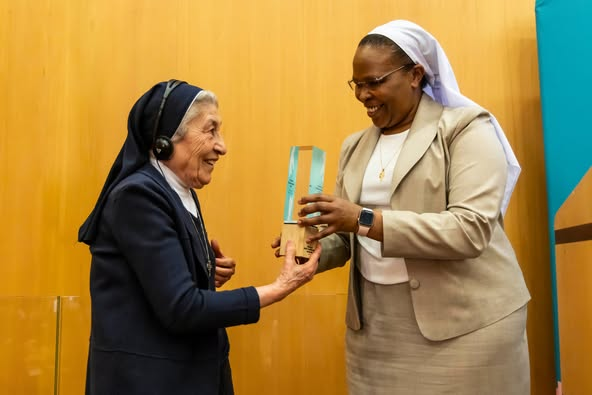
At the Sisters Anti-Trafficking Awards held in Rome on May 23, 2024, Sr. Marie Claude Naddaf, from the Lebanon-Syria Province, receives the Human Dignity Award for her lifetime achievement in addressing exploitation and protecting women and children in the Middle East from human trafficking. The award was presented by Sr. Jane Wakahiu, from the Catholic Sisters initiative at Conrad N. Hilton Foundation. (Courtesy of the Good Shepherd Sisters)
We are deeply grateful to our Good Shepherd Contemplatives, who uphold us through daily prayers and sacrifices. Annually, moments like the International Day of the Girl Child and the World Day Against Trafficking in Persons renew our commitment, reminding us that justice is a spiritual journey rooted in Christ's call to set captives free.
As I walk this path, I am deeply inspired by the courage of every woman and child. Their resilience fuels my hope for a world where dignity and justice prevail. Together, trusting in God's grace, we continue this synodal journey, knowing that love has the power to heal, restore and renew.
Joel Urumpil is a dedicated member of the Sisters of Charity of Nazareth, Patna Province, whose motherhouse is in Nazareth, Kentucky, in the United States. At 81, she remains a full-time social activist, committed to systemic change and grassroots development. In 1988, she left formal convent life to immerse herself in a people's movement in remote Jharkhand, where she has lived for 35 years. Together with local communities, she founded Chetna Bharati, an organization focused on rights-based issues and educational empowerment. As chief functionary and patron of a women's organization, she oversees remedial coaching, residential camps for marginalized youth, and support for aboriginal tribes and Mahadalits in vulnerable circumstances.
"What does your community do to address the issue of trafficking and exploitation, particularly of vulnerable women and children?"
A dangerous culture is creeping into society — one of indifference, silence, helplessness and even irritation. A child crammed in a factory or a woman in a brothel fails to arouse the collective conscience of society, including that of many religious devotees.
Too often, establishments unwittingly participate in this exploitation. What everyone sees has become too ordinary; few observe, and even fewer respond. School dropouts, plastic pickers, tractor loaders—young girls bought and sold—are lost in this cycle of exploitation.
The Sisters of Charity of Nazareth, founded in 1812 in the United States, expanded to India in 1947 with a mission to combat exploitation and illiteracy through health, social and educational initiatives. Addressing trafficking and exploitation is a crosscutting issue, pursued with a preferential option for vulnerable populations.
Since these issues intersect across various systems and policies, collaboration is essential. We work with people's movements and both secular and religious groups, targeting specific issues such as the "Movement Against Migrant Menace."
Our focus spans awareness, advocacy, and direct action. Awareness campaigns are critical to sparking societal change. Efforts include:
- Displaying visibility signs at crossroad junctions and marketplaces;
- Organizing events such as walkathons for children's rights, rallies advocating for women's rights as human rights, and campaigns promoting child dignity;
- Utilizing institutions and community-based organizations as strategic points for disseminating information to achieve wider coverage.
Advocacy efforts address systemic changes, including:
- Establishing task forces and budget planning for long-term impact;
- Issuing corporate statements and working with legislators to push for legal reforms;
- Collaborating with police departments and jail ministries;
- Strategic initiatives like a five-year plan aimed at reducing trafficking and unsafe migration rates.
Other measures include:
- Living among economically and politically disadvantaged populations to build trust;
- Reaching out to red-light districts for both service and advocacy;
- Providing mass education to children outside the formal school system;
- Strengthening community-based organizations, fostering responsibility within society, and promoting self-governance;
- Introducing policy interventions to create gender-friendly environments and employing "gatekeeping" mechanisms to protect at-risk populations;
- Integrating exposure to social realities into religious formation programs.
We are acutely aware of the missing links and strive to address them strategically. These include:
- Reaching a sizeable population of women and girls in remote villages who lack basic facilities;
- Shifting our focus from wealthier, more accessible populations to the marginalized and scattered;
- Moving beyond statistics, seminars and residential care to systemic advocacy for lasting change;
- Equipping institutions with technical expertise and preparedness to connect these missing links;
- Developing awareness of the broader intersections of caste, gender, poverty, politics and isolation, and fostering political will to address them effectively.
A concerted effort is in process. With political will and a depth of spirituality, we are "sent on a mission" to confront trafficking and exploitation head-on, ensuring dignity and justice for the most vulnerable.
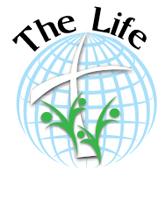
January is National Human Trafficking Prevention Month in the United States. Since 2010, January has been dedicated to raising awareness and preventing the devastating realities of human trafficking.
This month, we asked our panelists: What does your community do to address the issue of trafficking and exploitation, particularly of vulnerable women and children?
Their responses, rooted in their congregational charisms, offer hope, healing and advocacy to those affected by this profound injustice.








